
Indigenous representatives of Latin American countries hold a press conference during the United Nations Biodiversity Conference (COP15) in Montreal, Canada, on December 8, 2022. (Photo: Andrej Ivanov/AFP via Getty Images)
Montreal, December 10 (RHC)--With a global biodiversity summit underway in Montreal, Guardian columnist George Monbiot on Friday took aim at the United States for its "active, and deadly, cavalier attitude" toward the rest of the world, "an example other nations follow."
"Its refusal to ratify treaties such as the Convention on Biological Diversity provides other nations with a permanent excuse to participate in name only."
Although U.S. President Joe Biden recently appointed Monica Medina as the first special envoy for biodiversity and water resources, and his administration is participating in the 15th Conference of the Parties (COP15) of the Convention on Biological Diversity (CBD), the United States is notably not a party to the treaty, which was drafted in 1992.
In fact, the United States is the only United Nations member state not to ratify the treaty. The other 192 U.N. countries, the European Union, Cook Islands, Niue, and Palestine are all parties to the CBD—leaving the U.S. in the company of just the Holy See, the government of the Roman Catholic Church.
Former President Bill Clinton signed the treaty in 1993, but U.S. ratification requires 67 votes in the Senate—in which Democrats secured a 51-seat majority with Sen. Raphael Warnock's runoff victory on Tuesday, only to have Sen. Kyrsten Sinema of Arizona leave the party and declare herself an Independent on Friday.
As Monbiot highlighted: "This is one of several major international treaties the U.S. has refused to ratify. Among the others are crucial instruments such as the Rome Statute on international crimes, the treaties banning cluster bombs and landmines, the convention on discrimination against women, the Basel Convention on hazardous waste, the Convention on the Law of the Sea, the nuclear test ban treaty, the Employment Policy Convention, and the Convention on the Rights of Persons With Disabilities."
In some cases, it is one of only a small number to refuse: The others are generally either impoverished states with little administrative capacity or vicious dictatorships. It is the only independent nation on Earth not to ratify the Convention on the Rights of the Child. Perhaps this is because it is the only nation to sentence children to life imprisonment without parole, among many other brutal policies. While others play by the rules, the most powerful nation refuses. If this country were a person, we'd call it a psychopath. As it is not a person, we should call it what it is: a rogue state.
Monbiot argued that "through its undemocratic dominance of global governance, the U.S. makes the rules, to a greater extent than any other state. It also does more than any other to prevent both their implementation and their enforcement. Its refusal to ratify treaties such as the Convention on Biological Diversity provides other nations with a permanent excuse to participate in name only. Like all imperial powers, its hegemony is expressed in the assertion of its right not to care."
"The question that assails those who strive for a kinder world is always the same but endlessly surprising: How do we persuade others to care?" he continued. "The lack of interest in resolving our existential crises, expressed by the U.S. Senate in particular, is not a passive exceptionalism. It is an active, proud, and furious refusal to care about the lives of others. This refusal has become the motive force of the old-new politics now sweeping the world. It appears to be driving a deadly, self-reinforcing political cycle."
After outlining an example of destructive farming practices in the Netherlands, Monbiot stressed the urgency of the current moment, writing that due to years of failures, "we now approach multiple drastic decision points, at which governments must either implement changes in months that should have happened over decades, or watch crucial components of civic life collapse, including the most important component of all: a habitable planet."

